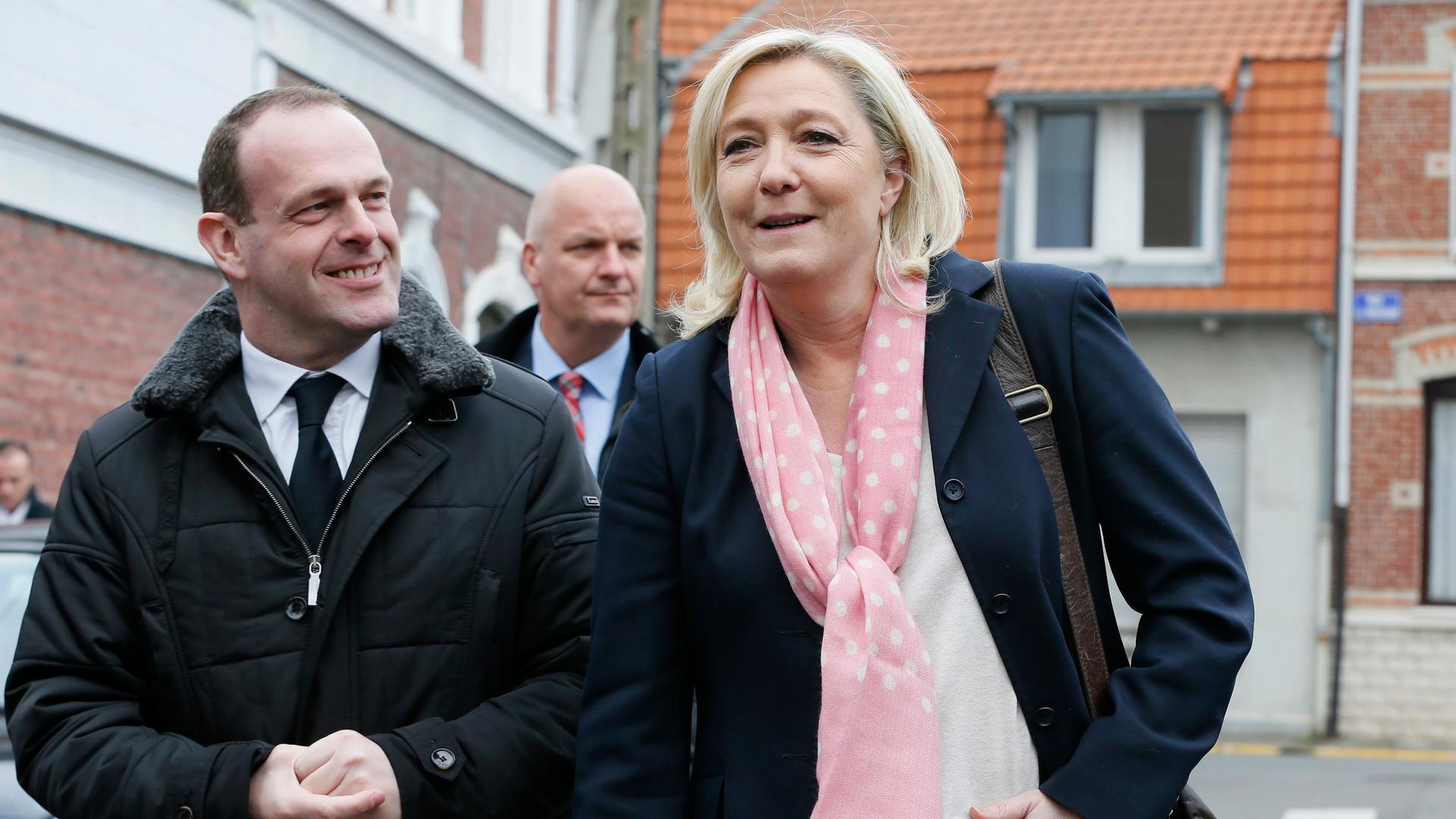In this French town, the National Front mayor gets support from local Muslims
France's far-right National Front leader, Marine Le Pen (R), and Mayor of Henin-Beaumont, Steeve Briois, leave a polling station, March 2015.
On Sunday, an extreme right party took the lead in the first round of the regional elections in France. The National Front achieved its best score in Northern France with 40 percent of the votes and a 15-point lead over the runner-up.
Political observers say the terrorist attacks last month in Paris weighed heavily on the results, with scores of voters turning to a party known for its hard line on security issues and immigrants — Muslims in particular.
But in Hénin-Beaumont, a small blue-collar town that has become the party’s forefront over the past few years, a highly popular mayor has contributed to changing hearts and minds about the National Front, which was long considered a pariah in the French political landscape.
The National Front raked in 60 percent of the votes there. For Steeve Briois, the mayor, it’s a clear show of confidence.
“In Hénin-Beaumont, we first proved that we could win an election,” he says, "then, that we could manage a local community … And do it well.”
Hénin-Beaumont counts just about 26,000 residents. Yet Briois’s campaign and landslide victory in March 2014 turned into a national story. Since World War I, this former coal-mining town had been run either by a socialist or a communist. The region is also home to scores of immigrants, including a high number from Algeria and Morocco, though the National Front is hardly known for being Muslim-friendly.
Its leader, Marine Le Pen, once compared Muslims praying outside mosques to the Nazi occupation of France. Just last week, her niece, Marion Maréchal-Le Pen, who leads the National Front list in the South-East region, set a dress code: “Here, in France, we don’t wear djellabas,” she said at a campaign rally, talking about the traditional Arab clothing.
I wondered what happens to a local Muslim community once the National Front actually assumes power, so I came to Hénin-Beaumont, its stronghold.
What I found out was as much of a surprise to me, as it was to Salem Kaci-Chaouche.
For 25 years, the Algerian chef cooked in some of Paris’ most famous high-end restaurants. He’s proud to share that he once made Alain Delon his favorite dish — fondue.
Kaci-Chaouche moved to Hénin-Beaumont in April 2014, just a month after the election of Steeve Briois. Considering the bad press, he wasn’t really expecting a warm welcome.
“I couldn’t have been more wrong,” he says now, while flipping lamb chops. “People are nice, they greet you on the street, not like in Paris.” And then, he says, there’s the mayor himself, who sometimes comes twice a week to eat his couscous.
“He's super friendly. He has a good heart, and that’s what matters, not his political color,” Salem says. “Plus, he's always talking to people, trying to help. That’s exactly what you want from a mayor.”
Kaci-Chaouche is hardly an exception in his opinion around town.
At the local mosque, where kids learn Arabic on weekends, community leaders say they have no problem whatsoever with the National Front mayor.
“Our relations with town hall are smooth and constructive,” says Abdelhakim Anseur, the mosque’s vice-president. “Every time we need them, they’re here. We’ve never felt like second-class citizens.”
It hasn’t been so in every other town run by the National Front. In a jab at Muslims, one mayor organized his town’s first “pork fest” last year. Another banned a belly-dancing show. Steeve Briois, on the other hand, has avoided making provocative gestures, and has even extended a hand.
He showed up in person at the Friday Muslim prayer after the Charlie Hebdo attack in January and called on locals not to lump together Islam and terror.
When asked if he feels at odds with his party in that respect, Briois says no, then explains that it’s the Muslims here who have made themselves a part of the community.
“They’re very respectful, they’re not trying to impose their religion and their views. They might be Muslims, but here, they’re just like your average Joe,” Briois says.
At the mosque, Anseur confirms: Muslims in Hénin-Beaumont are just like the rest of the electorate.
“There’s no such thing as a Muslim vote,” he says. “A lot of people in this region are choosing the National Front because of social issues like unemployment. I don’t see why Muslim voters would be any different.”
